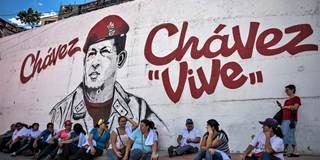Nearly two decades after the election of Hugo Chávez, the country he mismanaged has become a prison of poverty, repression, and seething popular anger. As Chávez's ghost haunts Latin America's most troubled state, the region's governments must respond forcefully.
CARACAS/LIMA – On December 6, 1998, Hugo Chávez was elected president of Venezuela. The effects of that vote – which most agree was the last free and fair vote in that country – are still being felt.
Upon securing the presidency, Chávez wasted no time selling Venezuela’s sovereignty to Cuban interests. Every attempt to counter the regime’s brutality was met with repression, imprisonment, starvation, and forced exile. From the judiciary to the electoral commission, the regime’s control of the state became total and uncompromising – an outcome that Venezuela’s Latin American neighbors did nothing to resist.
When oil prices skyrocketed, the windfall was stolen and squandered. By the time the bonanza ended, Chávez’s handpicked successor, Nicolás Maduro, was in charge. Less cunning than his mentor, he has maintained his grip on power by becoming a dictator, subjecting the country to his will and that of the ruling elite. Maduro’s regime has bankrupted the economy, destroyed the oil industry, and impoverished everyone except himself and his cronies.

CARACAS/LIMA – On December 6, 1998, Hugo Chávez was elected president of Venezuela. The effects of that vote – which most agree was the last free and fair vote in that country – are still being felt.
Upon securing the presidency, Chávez wasted no time selling Venezuela’s sovereignty to Cuban interests. Every attempt to counter the regime’s brutality was met with repression, imprisonment, starvation, and forced exile. From the judiciary to the electoral commission, the regime’s control of the state became total and uncompromising – an outcome that Venezuela’s Latin American neighbors did nothing to resist.
When oil prices skyrocketed, the windfall was stolen and squandered. By the time the bonanza ended, Chávez’s handpicked successor, Nicolás Maduro, was in charge. Less cunning than his mentor, he has maintained his grip on power by becoming a dictator, subjecting the country to his will and that of the ruling elite. Maduro’s regime has bankrupted the economy, destroyed the oil industry, and impoverished everyone except himself and his cronies.